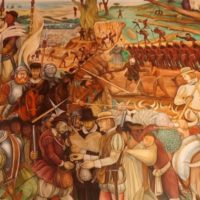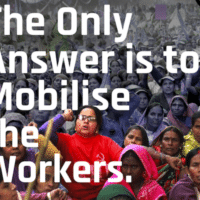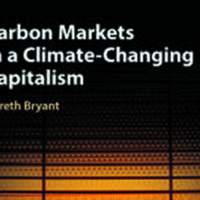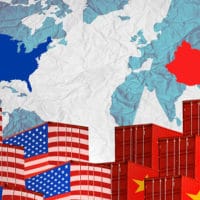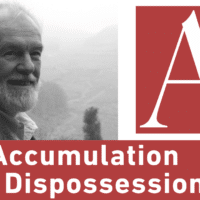-
Freedom and slavery: the birth of capital
We are frequently told that capitalism equals ‘freedom’; that it is the organic product of ‘human nature’. But far from arising naturally, the birth of the ‘free’ market is built on violence, dispossession, and enslavement.
-
How working-class movements are moving beyond the confines of capitalism
The context for organizing today that faces working people across the world is one that must grapple with the challenges posed by a decentralized production process and a well-organized ruling class.
-
Dossier 18: The only answer is to mobilise the workers
Tricontinental: Institute for Social Research launches its eighteenth dossier, “The Only Answer Is to Mobilize the Workers.” The challenges facing Indian workers and their strategies to fight back are explained through the insights and expertise of K. Hemalata, president of the Center of Indian Trade Unions (CITU).
-
Climate change, dust bowls, fishery collapse: metabolic rifts of capitalism and the need for socialism
Humankind and the environment are hurtling toward unprecedented ecological crises. Global warming, sea level rise, and weather extremes due to carbon emissions are catastrophic enough, but they will mix and combine with ocean acidification, air and chemical pollution, water shortages, deforestation, fishery collapse, soil erosion, and mass extinction, throwing both nature and society off a cliff into the unknown.
-
It’s not just profitability: a response to Michael Roberts
Michael Roberts takes issue with my blog post “Why Stagnation,” which presented the analysis in a recent article I coauthored with Deepankar Basu. We argued that social structure of accumulation (SSA) theory can explain the current stagnation in the U.S. economy.
-
The path to climate justice passes through Caracas
For now the U.S. regime change agenda has been defeated as a result of the mass mobilization in April and May of the Venezuelan masses in defense of their Bolivarian Revolution, a mobilization which succeeded in marginalizing the opposition led by U.S. puppet Juan Guaido, demonstrating how pathetic his claims of legitimacy were.
-
How Wall Street colonized the Caribbean
The expansion of banks such as Citigroup into Cuba, Haiti, and beyond reveal a story of capitalism built on blood, labor, and racial lines.
-
Brexit: imperialist Britain faces existential crisis
The Brexiters’ fantasy of a virile Britain freed from the straitjacket of EU regulations are crashing against harsh reality: Britain’s dependence on the European market compels it to maintain close alignment with the EU. But if it is ceases to be a member of the EU, it will have no seat at the ruling table.
-
Portrait of the 2009-2019 U.S. expansion
June 2019 marks the 10th anniversary of the current U.S. economic expansion. If it makes it through July it will surpass the 1991-2001 expansion as the longest on record. But while expansions are to be preferred over recessions, there are many reasons to view this record-breaking expansion critically. In fact, the nature of this expansion, hopefully captured in the following portrait, highlights the growing inability of the U.S. economic system, even when performing “well,” to meet majority needs.
-
Inflation & the Politics of Pricing with Nathan Tankus
In this episode, we talk with Nathan Tankus, Research Director of the Modern Money Network, and Research Fellow at the Clarke Business Law Institute at Cornell Law School. We ask Nathan to expand upon and deepen his engagement with the inflation question in all its historical, political, and rhetorical complexity.
-
Carbon markets in a climate-changing capitalism
Carbon Markets in a Climate-Changing Capitalism offers an account of why these earlier expectations were not matched by experience. While the contradictions of market solutions have not gone away, the difference this time is that we are just over a decade away from the IPCC’s 2030 benchmark for 1.5°C. The concentration and centralisation of emissions instead points towards a different pathway that can meet this challenge – one that begins by confronting the disproportionate control the biggest polluters have over our climate future.
-
Notes on Marx’s “General Law of Capitalist Accumulation”
Chapter 25 of Karl Marx’s, Capital, vol. 1 (“The General Law of Capitalist Accumulation”), not only explains the working conditions of the world’s peoples today; it also explains the conditions of our whole existence. Marx’s general law is nothing less than the lever upon which all our lives now pivot.
-
Disruption in the world of trade
What is noteworthy is that the deceleration in import volume growth has been particularly marked in the emerging economies of Asia and Latin America, pointing to a loss of momentum in the countries that were expected to be new growth poles in the immediate aftermath of the 2007 crisis.
-
Global inequality in a time of climate emergency
Our worlds richest have a great deal of money. They also have the power to decide whether our civilization sinks or swims. So what can we do?
-
The Unipolar Moment is over
The Russia-China strategic partnership, consolidated last week in Russia, has thrown U.S. elites into Supreme Paranoia mode, which is holding the whole world hostage.
-
To survive: we need a global awakening much bigger than a “revolution,” much deeper than just ending capitalism
The climate apocalypse will soon kill all of us (including the plutocrats), if we don’t take drastic measures right away. But the plutocrats are blocking those measures, because they don’t want anything cutting into their short-term profits. In this video I discuss the crazy culture that has us headed toward extinction. To survive, we need an immense cultural change.
-
Dossier 17: Venezuela and hybrid wars in Latin America
Dossier no. 17 reflects on the hybrid war unleashed against Venezuela. We document the repertoire of tactics, but also the motives behind them. We are interested not only in the recent attack on Venezuela, but in the similarities between this attack and others in Latin America over the past decades.
-
98.3 percent of Ghana’s gold remains in the hands of multinational corporations
Disproportionate focus on corruption of national leaders distracts from the systemic theft of Ghana’s wealth.
-
Anti-capitalist chronicles: Accumulation by Dispossession
Large capital takes over smaller capital and in the end you get a quasi monopolistic situation of the large capitalist dominating all else.
-
Finance and growth under neo-liberalism
A neo-liberal capitalist economy therefore does not have the instruments that capitalism earlier had for providing a bulwark against its slipping into recession and stagnation; the question is: does it have any instruments at all?

